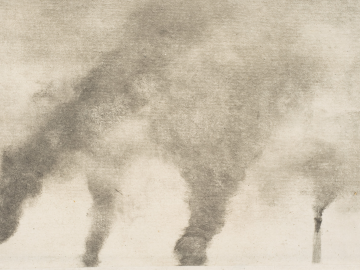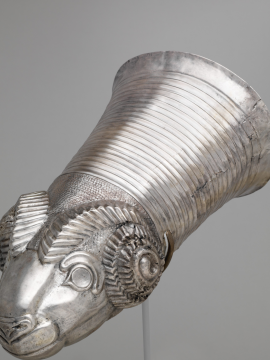A Moment of Light in the Einstein Cafe
Craig Cormick
Albert is sitting by the window, thinking about time and space and wondering where his teaspoon has gone, when he hears the two ladies come into the cafe. He glances up at them briefly, noting they are each wrestling a large baby carriage in with them, and then he looks around on the floor by his feet. It is inexplicable. He has already lost one teaspoon and has taken a spare from the table beside him. And now that has gone too.
How is a man meant to concentrate when his teaspoons keep disappearing? He looks back at the pictures he has been drawing on the paper napkins spread out on the table in front of him. He has drawn several straight lines and then a curved line over the top of them. He has been trying to imagine a way that the curved line might be shorter than the straight lines.
He glances up at the clock to see that more time has passed than he had imagined. Why is it that cafe clocks move so much faster than office clocks? He has often wondered about that, and he has been developing a theory on it. He supposes that his colleagues at the patent office will be noticing his absence about now, and his supervisor will be asking questions as to his whereabouts. He had left a vague message about having an appointment to go to, but had just wandered the streets of Bern for some time before finding this cafe and coming in out of the cold.
Walking helps him think, but he is having no luck with it today. And now his concentration is going to be ruined by these two women, who, he can see, are pushing chairs aside and making their way across to the table beside him. He is far too easily distracted by women, he knows. As does his long-suffering wife Mileva.
One of the two has bright red hair, barely restrained from chaos by a small hat, and the other has dark straight hair and a large black mole by her nose. The sort that absorbs your attention over any other features. They are both generously-built women and take up as much room as their baby carriages. And they are loud. Talking to each other as if a vast space separates them.
To his consternation, they not only position themselves at the closest table, but block him into the corner with their carriages.
He sighs and pours some more sugar into his coffee cup, forgetting for a moment that he has lost his teaspoon. He looks around him once again, and then stirs it with his pencil, creating a vortex in the cup. He watches it intently, as the red-headed women says loudly, ‘That’s better. My feet ache like I couldn’t tell you.’
‘Not as much as my privates hurt after pushing out his lordship here,’ said the other.
Both laugh at that. Far too loud and coarse to his ears, and undoubtedly they will wake the babies who will start wailing soon, too. He wonders if he should just rise and squeeze his way past them. He generally enjoys the proximity of women, but he knows they will distract him from the physics problem he has been pondering.
‘So, what do you fancy?’ asks the dark-haired woman.
‘Cake!’ says the other. ‘Cake and hot chocolate.’
‘Oh, yes please. I could murder a cake!’
They laugh again. Albert reaches into his pocket for his wallet, to pay the bill, and starts to rise.
‘How much time do you have?’ asks the red head.
‘Well, that’s the problem,’ says her friend. ‘When you’re doing something that you don’t enjoy, like cleaning the house or washing clothes, time passes so very slow, but as soon as you finds something enjoyable, time just flies past. Have you noticed that?’
‘It’s so true,’ says the other. ‘It’s because different time moves at different paces.’
Albert sits back down in his chair. The two women suddenly have his undivided attention.
The one with the wild red hair then signals to the waiter. ‘Well, we’ve time enough for cake and hot chocolate,’ she says. ‘Unless you prefer tea?’ Albert watches while they order and he draws a clock on his napkin at one end of his straight lines.
‘My husband says that clocks move at exactly the same pace, always, but that can’t be right, can it?’ says the red head. ‘I mean if that was the case then all times would feel like all the other times passing, wouldn’t they?’
Albert draws a second clock on the other side of the lines.
‘I have a cousin who works in a clock factory,’ the dark-haired lady with the mole says. ‘He says the same thing. I suppose he should know as he is an expert, but it just doesn’t seem like they’re right, does it.’
‘Is he a close relative?’ the red head asks.
‘We only see them once every few years at the most,’ her friend replies. ‘They find travelling takes up too much of their energies.’
Relative, Albert writes between the two clocks. And then Energy.
‘Talking of travel,’ says the red head, leaning in closer and lowering her voice just a little. ‘Did you see the widow Schmidt? She has a new suitor. A rather well-to-do fellow. He took her on a tour of the Mediterranean. And she’s come back looking five years younger!’
‘It’s a scandal,’ her friend says.
‘And it’s hardly fair,’ says the first. ‘We sit here day after day, doing the endless house work and child raising, still having to put up with our husband’s demands – if you know what I mean – never letting us get a wink of sleep – I mean either his young lordship here is after my breasts or it’s Rudi, but you just get older and older and more worn out and the widow Schmidt goes off for this trip and comes back looking younger.’ She tutt-tutts at the injustice of it.
‘It’s a shame,’ says her friend. ‘But getting yourself a younger lover would put a spring into any old woman’s step.’ And she winks lewdly. ‘I’m sure that if I went off for a trip around the Mediterranean with a wealthy young man, I’d walk back in here in six months time looking much younger.’
‘I’d come back looking so young that Rudi might start romancing me again,’ the red head says. ‘Those were the days,’ she says. ‘Wine and roses before you-know-what.’ They both laugh again.
Albert draws a large circle around the napkin, as if it were the path that one of the two clocks made around the other, and writes next to it Travel + Time =
‘But they are very foreign in other countries,’ says the dark-haired lady.
‘Oh yes. Very foreign indeed,’ says her companion.
‘How did she manage?’ the dark-haired lady asks.
‘Well, she said the food was quite odd, but edible, but she found going to church very disconcerting. She said the further they travelled the greater the difference in the mass.’
Albert writes that down too. Distance + Mass.
Then the waiter arrives with their cake and the lady with the mole by her nose says haughtily, ‘Excuse me, there’s a teaspoon missing from our table.’
The waiter apologises and says he’ll get another, shooting a quick look at Albert. He must have seen him taking it, he supposes. The two ladies turn their heads to see where the waiter is looking and seem surprised to see Albert sitting there so close to them. He gives them what he believes is his most charming smile, but they both look him up and down briefly and then turn back to each other as if he isn’t there. As if they can see he is nothing more than an unemployed teacher who works as an assistant patent examiner.
The dark-haired lady licks her lips and stares at the cakes longingly. ‘Wait a moment,’ says her friend. ‘I want to try something.’
‘What?’
‘Close your eyes and I’m going to give you one of the cakes to taste, and you’re going to tell me what flavour it is.’
The dark-haired lady smiles and nods her head eagerly. She shuts her eyes and opens her mouth wide. The red head cuts a chunk of cake off with her spoon and steers it carefully towards her friend’s mouth. The other gapes about, smelling the cake coming nearer and trying to anticipate where it is. ‘Hold still,’ her friend says and shovels it into her mouth.
‘Mmmmm,’ she says. ‘Marvellous. Lemon and cream.’
‘Exactly,’ says her friend. ‘Now my turn.’
Albert is captivated. He watches the red head close her eyes and her friend waver between choosing the other cake and the same one. In the end she chooses the same one. She holds the chunk of cake up precariously on her spoon and guides it slowly up to the waiting mouth.
‘Mmmmm,’ says the red head. ‘That’s the lemon and cream again.’
‘That was fun,’ says the other. ‘I should try it at home some day.’
‘What? Close your eyes in the darkness and decide if it’s your husband or not?’
Both laugh lewdly and cake crumbs spray across the table. Albert is both appalled and fascinated at their unashamed coarseness.
‘Have you ever noticed,’ says the red head in a near whisper, ‘That men seem faster when it’s still light and slower in the dark.’
Her friend tilts her head a little and thinks about it. ‘I think you’re right,’ she says. ‘Why do you suppose that is?’
‘I’m not sure, but there’s bound to be some interesting relationship between speed and light.’
Albert writes those words down too.
‘Now,’ says the red head. ‘Talking of intimate relations, do you know what Frau Schrödinger told her husband? Have you heard this one?’ She lowers her voice once more, and her friend leans in closer.
‘No,’ she replies. ‘Though it’s bound to be saucy, knowing her.’
‘Well, when her husband comes to her in bed, you know, asking her if she would allow him the pleasure, she says, “You have to guess whether my private parts are opened or closed to you”.’
Her friend puts a handkerchief to her mouth and giggles deliciously. ‘She’s such a wicked one, isn’t she.’
‘But that’s not the end of it,’ says the red head. ‘See, because whatever her husband says, she could simply say the other if she wasn’t in the mood for it, but then one day her husband says that her private parts are both open and closed at the same time.’
Her friend starts to laugh and then stops and cocks her head to one side. ‘How can that be?’
‘I don’t know. She tried to explain it to me. Something to do with science.’
But their laughing has woken one of the babies, just as Albert had suspected, and the red-haired mother leans down and lifts him up. Glancing quickly about she undoes the top of her dress and puts him onto her breast while her friend drapes a white cloth over them. Albert tries very, very hard not to look, and feels a warm blush creeping up his neck. He turns his attention back to the lines on the napkin he has drawn and then has another half-hearted look for the missing teaspoons.
The baby falls back to sleep quickly and the red-haired lady says, ‘Thank goodness for that. Normally his stomach is like an endless black hole that just never seems to fill.’
‘Well, it’s where they get all their energy to grow,’ says her friend.
Albert writes black hole on the napkin, next to energy. He then hears the baby cough and vomit up some milk, and sees the child’s mother use the white cloth to wipe him, before laying him back in his carriage. Then she scrunches the cloth up in her hands.
‘No, no,’ says the dark-haired lady. ‘Not like that. You’ll just spread the mess everywhere. Let me show you.’
Taking the cloth she spreads it open over the cafe table, and then folds it neatly in half, and then half again. ‘See,’ she says. ‘Only this bit of the cloth is covered in vomit and the rest is clean to use again.’
‘How very practical,’ her friend says.
‘You know,’ says the dark-haired woman, unfolding the cloth, ‘I sometimes think this simple act of folding a nappy or cloth captures our lives.’
‘How so?’
‘Well,’ she says, ‘We start with it all clean and spread out and open like this. But sooner or later you get shit on it, and you never have the option of just leaving it there. We have to fold it up to go about our lives, to pack up baby things to carry and so on, and when you fold it up, the shit spreads to other parts of the nappy – or other points of your life.’ She folds the cloth over again. Then again. ‘So the more you fold this up, the more things you do in life, the more the shit travels across your life, from here to here and here.’
Her friend nods. ‘I know what you mean, dear. But what if you could fold that nappy of your life over in the manner of your choosing and find ways to cover the shit stains and you could just go from one clean bit to another.’
Her friend looks dreamily out the window. ‘That would be something,’ she says.
‘You know,’ the red head says, ‘Somebody ought to invent a clock that went really, really fast during those terrible shit-stained parts of life, and then slowed right down during those pure enjoyable times.’
‘Like eating cake and hot chocolate?’ asks her friend.
‘Exactly.’
‘Or when travelling the Mediterranean with a young lover?’
‘That too, I’m sure.’
The two women laugh loudly again. ‘You should have a word to your cousin about it,’ the dark-haired one says. ‘Tell him to invent it and then take his invention to the patent office. Tell him it would make him rich.’
‘Don’t you wish you could sometimes see into the future,’ her friend says, watching the way the dark-haired lady peers into her now empty tea-cup, swirling the remains of the tea leaves around a little.
‘There is no use in worrying about the future,’ the dark-haired one says. ‘It will come soon enough.’
But Albert only half hears that. He is staring at the napkin in front of him intently. He folds it over slowly and then presses his pencil onto one point and makes a large dot. Then he unfolds the napkin to see the dot has travelled across to the far side of the lines he had drawn. He blinks several times and then underlines each of the words he has written and starts writing furiously on another paper napkin. And then on another.
When the waiter looms over him and asks if there is anything else that he would like to order, Albert looks around and sees his two muses have left the café and he had not even noticed. Then he looks up at the clock on the wall.
‘Oh my,’ he says, and stands. ‘The time!’ He pays the waiter for his coffee and hurries out of the café. He rushes along the street back towards the Patent Office and finds his feet carry him faster and faster and he feels the marvellous thoughts inside his head growing, as if they might expand and fill the whole universe. And as he hurries on he pushes the paper napkins with all his scribbled thoughts on them into his pocket he find something quite unexpected there. The two missing teaspoons.
Feature image photograph by Oren Jack Turner, Princeton, N.J.


